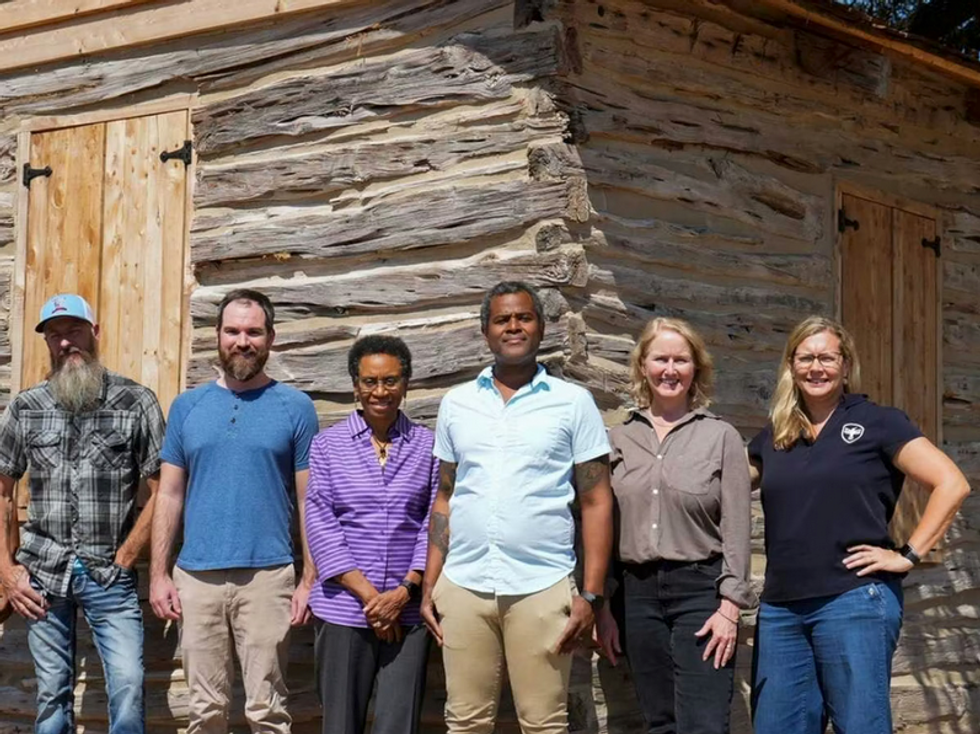fiction, fantasy and beyond
Literary journal Unstuck finds truly fantastic writing that embraces the surreal
It’s easy to get distracted by labels, especially in the literary world. Classifications of “chick lit” or “historical romance” can kill an otherwise brilliant work’s chances at appealing to the MFA crowd, while the term “literary fiction” might come across as condescending to some.
The editors at newly-launched Austin annual Unstuck know well that genres are a tricky thing. The journal, a beautifully bound tome (also available in Kindle format) aims to highlight literary work with elements of the fantastic, taking inspiration from writers whose bibliographies could be considered fiction, fantasy, sci-fi and beyond.
“We’re really drawn to surrealists, magical realists, people who are sort of dancing on the border between literary and speculative fiction,” explains Executive Editor Matt Williamson, a UT alum who holds an MFA from the Iowa Writers’ Workshop. He co-founded the journal with several other authors when they realized there was a lack of magazines “that publish smart, speculative fiction written with literary quality and attention to language and character. We think there should be several, and that we should be the first.”
There are many publishers and journals that focus on traditional sci-fi, or popular fantasy genres. (Macmillan imprint Tor — who incidentally gave Unstuck a glowing review — is one of the biggest examples.) But, while they attract huge and loyal audiences, often they’re marketing to existing readers, “not attempting to reach an audience outside their sphere,” Williamson explains.
“We wanted to make a magazine that would be something people would want to read on the subway, that would appeal to literary readers. Something that the McSweeney’s and Tin House crowd would be interested in, but that people reading fantasy science fiction crowd would also consider theirs. Something that every reader could feel comfortable with.”
The rest of the editorial board includes Mia McIver, a writer currently living in southern California; Josh Rolnick, author of the John Simmons Short Fiction Award-winning collection Pulp and Paper, and the publisher of Jewish journal Sh’ma; and Anjali Sachdeva, a writer, literature professor and an Assistant Editor at Creative Nonfiction.
Trying to define that special “spark” the staff looks for is difficult, a sentiment that’s been echoed in recent pub biz discussions on defining literary genres.
“There’s a lot of discussion now on where the border between literary and speculative fiction lies, and what it means to ‘cross over,’” says Williamson. “We’re really not interested in that discussion. We don’t want you to have to join that conversation to enjoy our stories. We’re more interested in creating a meeting place for readers and writers of all interests.”
Issue One, which launched last month (you can read excerpts online), has all the right ingredients: the 352-page volume contains fiction from Aimee Bender, Amelia Gray, Matthew Derby, Joe Meno, Rachel Swirsky, J. Robert Lennon and many more, plus poetry from Kiki Petrosino, Zach Savich, Dan Rosenberg, Kaethe Schwehn and Patrick Haas, and non-fiction from Rennie Sparks. Among them, contributors have won two Nebula awards, as well as the Pushcart Prize, the Calvino Prize, the New Writer Award, the Iowa Poetry Prize and the Colorado Prize — that’s a lot of esteemed authors from a wide variety of communities.
As literary blog The Spiral explains: “[T]hese twenty-odd stories and poems have come unglued and float, however precariously, in the firmament, in ‘otherness,’ in worlds almost like our own but somehow, someway…skewed… [T]hese pieces toy with and subvert form, structure and what’s expected from a story.”
Pieces sway between the decidedly surreal — like Matthew Derby’s “Dokken,” set on a floating garbage continent in the middle of the sea, and Leslie What’s “Big Feet,” which explores the grief of a recently orphaned giant — to the microscopically mundane, like Helen Phillip’s “R,” featuring two characters who have just experienced the sensation of wind for the first time.
Unstuck isn’t just focused on publishing; they’re also currently hosting a fee-free writing contest (accepting submissions through Dec. 31). “We figured, instead of spending $1,000 a year on ads, let’s spend $1,000 a year on a contest,” says Williamson. They’ve got some sweet prizes lined up: first place wins $200 and publication in Issue Two, and the top two finalists both receive a copy of every book from every Issue One contributor. The top six finalists will each receive a one-year subscription to the literary magazine of their choice.
Submissions are only accepted via Twitter. Unstuck explains:
Your submission must be broken into exactly twelve “tweets” – i.e., twelve sections of no more than 140 characters each. Spaces and punctuation marks count as characters. Your complete submission, poem, or essay will therefore run about 250-350 words, and will consist of twelve tiny parts. (Each finalist will be published on our Twitter feed in these twelve parts.)
The theme is “Lovemarks,” a slightly eerie idea concept that’s gaining popularity in the advertising world.
“The idea is to make someone fall in love with a brand the same way they would fall in love with a person,” explains Williamson. “It’s sort of this new school of thinking in the ad world, to make people feel intimacy with brands and corporations.” Those overly-friendly Tweets from Wendy’s? Lovemarks.
The contest itself is “sort of sci-fi inflected, but there’s no requirement that it involves elements of science fiction,” Williamson says. “We’re asking people to submit short pieces dealing with the idea of corporate personhood, or the idea of actual intimate love with a brand.”
Nam Le, Fiction Editor at the Harvard Review, will select the winning entry from the top six finalists. The remaining five will be posted online, and all contest entrants will have a chance to vote for their favorite runner-up.
What’s next for Unstuck? They’re already reviewing submissions for next year’s Issue Two (check their site to find the next open submission window), and they’re getting ready for late February’s AWP Conference, an annual gathering of writing programs and publications, where they’ll be hosting a panel called “Beyond Pulp,” featuring several current contributors. Unstuck is also hosting an event at the Hyde Park Theater the last Sunday in February, one of four annual readings they’re hoping to present.
And speaking of presents, the Unstuck editors will be wrapping gifts at BookPeople tomorrow (Wednesday, Dec. 14) and Thursday (Dec. 15), offering holiday cheer and a helping hand to shoppers.
If you’ve got stockings that still need stuffing, we suggest heading over for a few copies of Unstuck. Or, better yet, gift a subscription. At just $10 a year, it’s a great way to discover new writers while supporting local arts — Unstuck donates a portion of print profits to schools, libraries and literacy programs.
---
Visit Unstuck online for more information on the first issue, the contest and upcoming events.

 The Neill-Cochran House Museum's mid-19th-century slave quarters received Planning and Historic Designation grant support for restoration and historical interpretation.Photo courtesy of Preservation Austin
The Neill-Cochran House Museum's mid-19th-century slave quarters received Planning and Historic Designation grant support for restoration and historical interpretation.Photo courtesy of Preservation Austin Built around 1863, the Henry G. Madison cabin in Rosewood Park received Bricks and Mortar grant support for preservation planning work.Photo courtesy of Preservation Austin
Built around 1863, the Henry G. Madison cabin in Rosewood Park received Bricks and Mortar grant support for preservation planning work.Photo courtesy of Preservation Austin